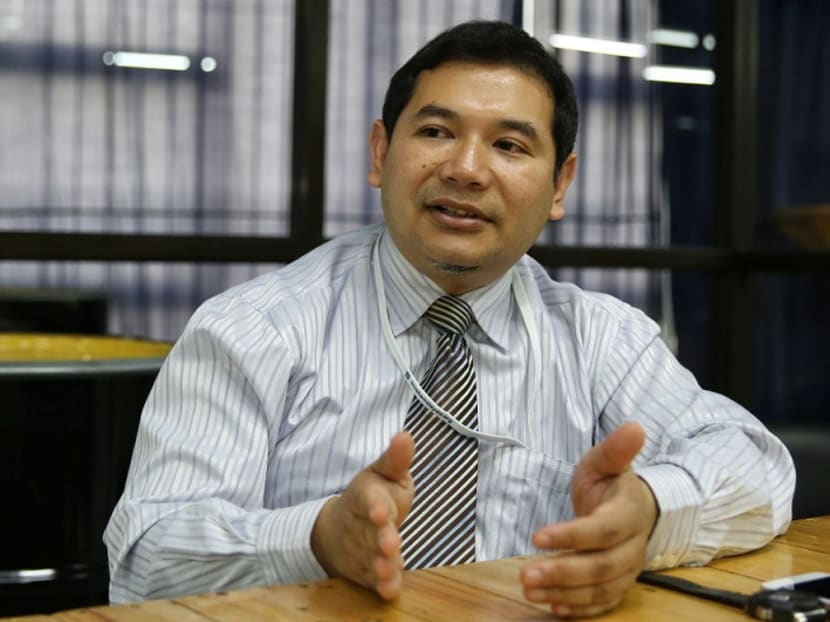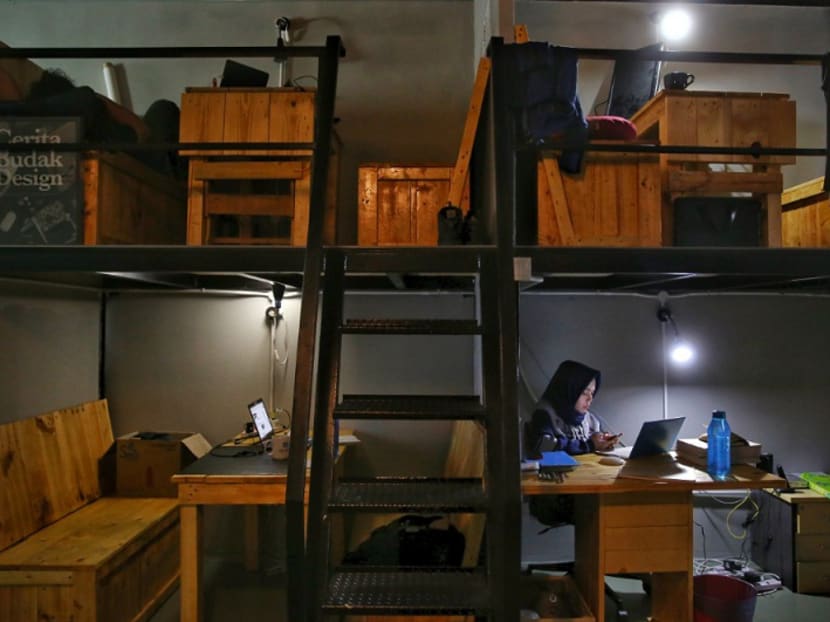In lead-up to elections, Malaysia’s political parties harness power of big data
KUALA LUMPUR — At Invoke’s office here with its hip double-decker cubicles, 20-somethings crunch data ranging from basic demographics to one’s preferred choice of Prime Minister, in search of that elusive goal - identifying and swaying fence-sitters.
KUALA LUMPUR — At Invoke’s office here with its hip double-decker cubicles, 20-somethings crunch data ranging from basic demographics to one’s preferred choice of Prime Minister, in search of that elusive goal - identifying and swaying fence-sitters.
Invoke, a big data analytics outfit started by Parti Keadilan Rakyat (PKR) vice-president Rafizi Ramli last August, is working with 50 candidates for the next general election (39 from PKR, 10 from Amanah and one from the Democratic Action Party), in mostly federal seats and some state constituencies in Negri Sembilan and Kedah that are deemed crucial for the opposition Pakatan Harapan coalition.
Using electoral roll data as well as phone polls, Invoke surveys voters on everything from basic details such as age, residential postcode, gender, race and religion, to political leanings, stand on issues like Syariah law and whether their votes are transferable between opposition parties, in order to come up with a “microtargeting” strategy and identify swing voters with a 40 to 60 per cent likelihood of voting for them.
“You should never preach or campaign to converted people,” Mr Rafizi told Malay Mail Online in a recent interview.
“We should only campaign to persuadable swing voters, and in our case, Opposition, we need to work on those voters who were either genetically Umno (United Malays National Organisation), but now feel like they hate Umno for whatever reasons, or those voter groups or clusters whom by profile have grouses with Umno.
“But of course the biggest issue is, yes that’s common sense, but how the hell do you know who is who? That’s why we need as many survey results as possible,” the Pandan MP added.
BIG DATA, BIG RESULTS
Big data analytics have long featured in American politics, such as the 2012 Barack Obama campaign. Mr Narendra Modi’s campaign in the 2014 Indian elections also reportedly used data analytics. A firm called Cambridge Analytica reportedly helped Mr Donald Trump win the United States presidency by collecting huge amounts of personal data on voters, from basic details to the TV programmes they watch or food they eat, to determine their personalities, or “psychographic” profiles.
The big data trend has arrived in Malaysia, with Parti Islam Se-Malaysia (PAS) and parties from both Barisan Nasional (BN) and Pakatan Harapan telling Malay Mail Online that, after Election 2013, they started using data analytics services provided by companies and think-tanks.
Most of the data that Invoke collects comes from surveys. The electoral roll provides information like the voter’s date of birth, address, polling station, race and religion.
Invoke conducted a survey last January with 104,000 respondents on which party they would vote for in a three-cornered fight.
The organisation is currently working on a survey with 10,000 respondents to determine vote transferability among opposition parties, trying to find out, for example, if those who vote for PKR may not necessarily vote for Amanah or Parti Pribumi Bersatu Malaysia (PPBM), amid Pakatan Harapan’s plan to contest the 14th general elections under a common logo and coalition name.
Invoke, which uses an automated telephone service for surveys with large sample sizes, is also planning to conduct socio-economic profiling of voters to get data like their job, household income, personal income, spending habits, education, assets, their children, what kind of house they live in, and whether they are living in a rented or purchased property.
“We should be able to have quite reliable profiling by June,” said Mr Rafizi.
When asked if Invoke’s big data analytics would be used to come up with personalised messages for prospective voters, Mr Rafizi said it may not be necessary as the point of the exercise was to profile “marginal” and “persuadable” voters.
“If for example, a female worker in Johor with certain traits … only has 30 per cent chance of voting Pakatan, we ignore her. Our candidate will not even talk about her because it takes so much effort to convert her. You just focus on who falls in the marginal — it’s those issues you focus on,” he said.
He said the goods and services tax (GST), salary levels and migrant influx may be common issues relevant to all the 50 constituencies that Invoke is working in.
“If you give some solutions to this and you convince them, it already covers 90 per cent and it may be able to convert 90 per cent. Then I don’t have to go into the details of talking about what Alor Setar residents want,” said Mr Rafizi, noting that “micro-level” messaging would be more expensive.
“Sometimes, there’s only three or four things that people just want to hear. We just need to get our candidates to talk about the same thing.”
Invoke has 82 staff in 15 offices throughout the country, comprising 71 full-time and 11 part-time workers. There are over 30 call centre staff, who are the biggest group, as well as statisticians, software developers, content developers, campaign strategists, fundraisers, and field campaign coordinators among others.
Mr Rafizi said Invoke spent RM2 million(S$633,660) in the last six months and its operating budget is about RM300,000 a month.
Social media tracking
AutoPolitical, a political artificial intelligence (AI) start-up based in Singapore, said it worked with “a handful of candidates” from two parties in the Sarawak state election last year and won all its campaigns.
AutoPolitical founder Roger Do, who is Taiwanese, said his firm’s AI programme tracks a candidate’s influence on social media, identifies opinion leaders on issues that a candidate campaigns about, and can tell which message is more influential than other messages, which metaphors are more appropriate, or how the audience really sees the message.
“The AI programme works like this, Mr Do told Malay Mail Online in an email interview. “The human campaign manager would feed the info into the programme about the campaign, candidates, and a few simple questions about issues and backgrounds. Our system then generates the appropriate strategies for the campaign managers to choose from.
The programme then proposes activities. Once a campaign manager inputs dates and adjusts items, the system creates a work list for campaign workers to execute – all this in just 20 minutes.
According to Mr Do, AutoPolitical is working with four parties and “a low triple digit number of candidates” in parliamentary seats for the 14th general election in Malaysia that must be held by next year. He declined to reveal his clients’ identities.
“Some parties are prioritising ‘marginal seats’, where the office was won with single-digit (percentage point of) votes, for our AI election software, one is negotiating for a party-wide use of our software for all the contested seats, some are having us build their social media team, while one is using our AI as part of their strategy planning,” he said.
Mr Do, who had worked on Taipei mayor Dr Ko Wen-je’s 2014 campaign, said his firm’s analysis of events or actions — which have both the candidate’s and audience’s social media posts, photographs, and videos — would be able to tell the campaign manager if the candidate was well-received, if the message was working, and if voters could be activated to be volunteers, donors, or evangelisers.
“Sometimes, messages have reach (virality) without having impact (engagement). For politics, the standard formula is to package impact materials in a viral shell, which usually comes down to (the) story of imminent danger and saviour/solution as our candidate.
“(Watch how one party will position outside foreigners as a reason why internal foreign-born Malaysians cannot be trusted to guard the national interest in this election),” said Mr Do.
He added that AutoPolitical’s election AI costs about the “monthly salary of two to three social media workers”.
International media intelligence company Meltwater said it has been involved in Malaysian general elections since 2008 and is currently working with one party for the upcoming election. It said it worked with five candidates or parties in Election 2013, but declined to name them.
The firm, which is based in San Francisco, said it tracks a candidate’s influence and topics on social media and in the news, identifies positive and negative mentions of the client, and compares it to the competition.
“We provide outside insights from analysing the share of voice, sentiment, and engagement to a particular topic,” Meltwater communications director Ambera Cruz told Malay Mail Online in an email interview. “From the data, we also help to identify the opinion leaders from their share of voice and the engagement received to their voices.”
OPPOSITION AT A DISADVANTAGE
Mr Oh Ei Sun, who was Prime Minister Datuk Seri Najib Razak’s political secretary from 2009 to 2011 and is currently a senior fellow at Singapore’s Nanyang Technological University, said Malaysian politics as a whole would move towards the use of political consultants like in the United States.
“But again, this runs into the problem of asymmetry between the financial wherewithals of the incumbent versus the Opposition because professional election consulting doesn’t come cheap.
“So the Opposition will be placed in a decidedly even less advantageous position,” Mr Oh told the Malay Mail Online.
He said the Opposition, with its “puny” resources, would still have to largely rely on IT-savvy volunteers who may not be public relations or election professionals.
Mr Adib Zalkapli, political analyst at Vriens & Partners, a South-east Asia-focused public affairs firm that advises multinationals on political risk in the region, said political parties appear to be collecting and using bigger volumes of voter data compared to previous election campaigns.
“Invoke Malaysia, for example, surveyed more than 100,000 voters early this year. No doubt voter survey is not new, but the sample size is a lot bigger this time,” he told Malay Mail Online.
When asked if BN would have an advantage in the 14th general elections with its growing influence on social media, he said: “I think the biggest challenge is to translate the data or information gathered from voters into (a) policy proposal or election manifesto.”(THE MALAY MAIL)








